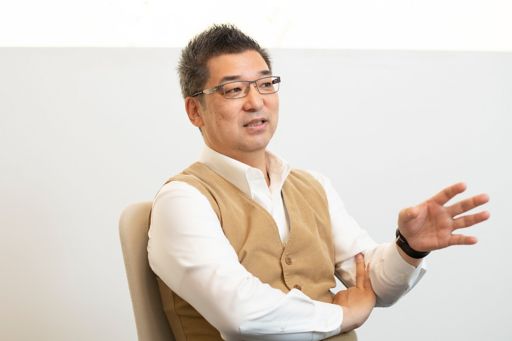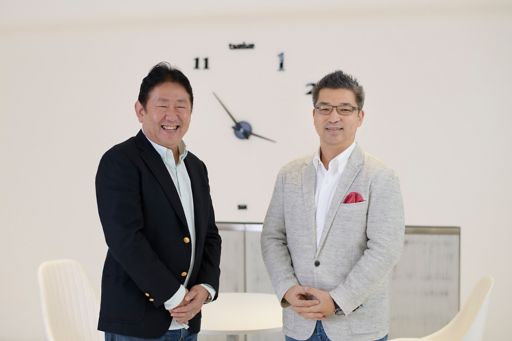The spread of COVID-19 has brought about dramatic changes in all kinds of aspects in a short period of time. And to our surprise, we find ourselves accepting these changes rather smoothly and even rewriting the previous normal spontaneously.
So, how will technology change under the new order and how will it impact us in the Post-COVID-19 world? And what kind of opportunities will there be in the process? Masayuki Chatani and Tim Denley of KPMG Ignition Tokyo envision the future while putting the current situation in order.
Contents
- Common Knowledge that Has Been Shaken by COVID-19
- Nevertheless, Work Cannot Be Completed via Online Alone
- Acquiring the Ability to Determine Global Changes with Calmness
- Japan’s DX Has Reached the Fifth Station. What Is Needed Next?
- Managers Will No Longer Be Able to Say “It Was Unforeseen”
- What is Necessary for Organizations to Survive in the Post-COVID-19 World?
- What is Necessary for Promoting DX for Individuals?
- Outlook for Digital Management
Common Knowledge that Has Been Shaken by COVID-19
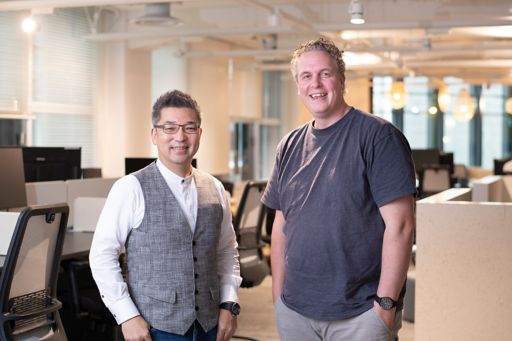
(Masayuki Chatani, Representative Director & CEO of KPMG Ignition Tokyo and CDO of KPMG Japan (left); Tim Denley, Board Member & Partner of KPMG Ignition Tokyo (right)) *Professional affiliation and official position in the article are at the time of publication.
Chatani: What happened in the past six months was that we came to understand that things which we thought were not possible, including work, can actually be done “remotely.” And I believe that we are now at a stage where we are beginning to feel that “everything cannot be done remotely after all.” It seems that everyone is seeking to promote teamwork remotely but wanting to realize an experience where they can feel as if it is face-to-face. I feel that there are great expectations regarding solutions to this “niche” demand.
On the other hand, the movement to abolish seal stamping is becoming active. The COVID-19 crisis is beginning to unlock doubts that “traditional practices that have been lingering in Japan may after all be meaningless.”
Denley: I myself am one of many who have been complaining “why does the seal stamping system still remain in Japan” for many years but have done nothing about it. Various ideas must have emerged by now but none of them have quite been promoted. The major change in the COVID-19 crisis, I think, is that we have come to think that “things must be changed after all.”
As an example of the changes, the frequency of meetings held globally has changed. Meetings had been held every six months with everyone traveling and gathering together but now that they are held online every other week, we are able to track the progress in more detail.
Chatani: This means that real time has been secured thanks to digitalization. We can constantly monitor the progress and meet together online whenever necessary.
This advantage is effective not just globally but domestically as well. When we had a meeting with group companies, it took 15 minutes one way and a 30-minute round trip to attend the meeting if the venue was located in a different building. This means that it took a total of one hour for traveling to attend two meetings. Considering this, meetings have become quite productive, as we can be connected online with only a click.
Nevertheless, Work Cannot Be Completed via Online Alone
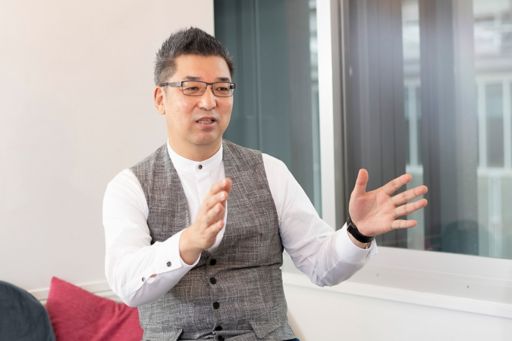
Chatani: However, problems are starting to occur due to the limited presence of online operations. We had a real external meeting the other day and there was one member who was joining us later. None of us had met him before, and although we knew his face, we could not ask the other party to bring him to the meeting by conveying his features such as “he’s tall“ or “his physical type is...” This is when I thought that “online technologies that can convey information that is difficult to convey digitally, for instance, atmosphere, may come out in the future” and that “there is a business opportunity if there is a service that can compensate for what we have been able to share physically.”
Denley: Such technologies will probably increase gradually. AR and VR technologies are already becoming more sophisticated and I’m sure that it should not be difficult to talk online as if one is talking face-to-face. Technologies that “connect the real and virtual worlds” will probably develop for some time.
This also goes for medical services. In this COVID-19 crisis, medical examinations including initial consultations have basically become possible online and I think this trend will advance further going forward.
Chatani: When we go to the hospital, our pain and disorders tend to disappear perhaps due to nervousness. As electrocardiograms can only monitor the patient for a short period of time, the odds of disorders appearing during the monitoring time is very low. This method will probably change to a simpler and more familiar method that can monitor continuously, which, I understand, is already possible. If data can be taken where there is no machine, the accuracy of examination will be enhanced with detailed information.
Denley: Things will change to focus on real-time features of data not just in the medical world but in all areas and if so, things that were not possible before may become possible.
Chatani: True. The promotion of real-time auditing is still being anticipated today. Auditing is currently carried out after the books are closed and is announced at the general shareholders meeting. But if real-time auditing of data becomes possible, it will even be possible to close the books and settle the accounts every day.
Currently, complaints are sometimes heard that announcements made at shareholders meetings are “too old. They’re a thing of the past,” but if real-time data can be acquired and analyzed, I think this will be improved.
Denley: The technical foundation for these has been prepared already, such as 5G.
Chatani: Before we were able to acquire highly real-time data, I think decisions were made statistically. For instance, the year-end highway traffic congestion prediction system makes forecasts based on past data. However, as data can now be collected from cars and smartphones, it has become possible to show where and how long traffic jams are and what kind of inflow and outflow will be necessary to resolve them. This will probably become possible not just for cars but in all kinds of areas.
Denley: If we can go to the next step, we will be able to forecast “what will happen next if this occurs” through real-time data and take measures accordingly. This means that it will be possible to elaborate that “if there is an accident here, people must be led this way.”
Acquiring the Ability to Determine Global Changes with Calmness
Denley: I would like to talk a little bit about the macro-environment. When we look across the world amidst the COVID-19 crisis, what do you think will become of U.S.-China geopolitics and technology in the future?
Chatani: While operating systems and semiconductors have been mainly developed in the U.S., Chinese operating systems are beginning to emerge. South Korea was also exploring the OS business at one time but was unsuccessful. However, a Chinese OS may become the third-generation OS following iOS and Android.
OS development seems to have ended but, in fact, it is still continuing. HUAWEI and others are also emerging in the semiconductor market. They are making something similar to ARM architecture so I feel that the timing is becoming extremely interesting.
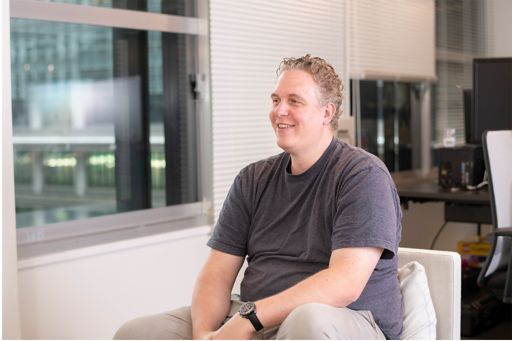
In Silicon Valley, fifth-generation architectures such as “RISC-V” and “RISC” have recently been attracting attention. What happened is that because ARM’s royalties became too high as it overtook the mobile device sector, many people started to turn their attention elsewhere and returned to RISC.
As the patent for the early stage of RISC’s instruction set has expired, there is an advantage that one can utilize the old set without anyone complaining. This is why it is now starting to be employed in various architectures, such as by establishing an organization with Professors John Hennessy and David Patterson as advisors
As CPU designs are logical, if such movements can be seen in Silicon Valley within a few years, similar movements will naturally occur in China as well.
In the early Silicon Valley days, rebooting in the technology area started with companies including Fairchild. Although the competition from semiconductor players to the cloud has been decided, I feel that it will reboot again and U.S. and Chinese players may play central roles.
Denley: So, how will it be affected by geopolitics?
Chatani: If the Trump administration remains in power, it will continue to be difficult for those without U.S. nationality to operate. Then a trend may occur where they will leave the U.S. and be accommodated by Chinese subsidiaries. This is because companies that can undertake this role cannot be found in Europe now.
Denley: I intend to focus on how this will have an impact in the medium to long term.
Chatani: There is also the aspect that China’s country risk cannot be underestimated. It will be difficult to determine whether such a movement will become common, but technology is comparable and there are overwhelmingly more theses in China than in the U.S. It may be natural that engineered technologies will emerge.
Denley: Talking about China, I really feel that they are “young.” My impression is that even though they are young, they have something similar to the experienced personnel in the U.S. I can also sense the atmosphere that they will develop in the future.
Chatani: As for products, there are increasingly more products whose finish and texture may be inferior but whose functions and utilities are the same. As there is no problem with the function, it will depend on the consumers’ preference and choice.
Denley: Those are precisely the changes I felt about China at the CES (global technology trade show). They had never set up a booth in the center of the venue until five years ago but DJI set up an extensive drone-related exhibition in 2018. I personally bought an audio product made in China but it is very well made and I felt that the customer experience (CX) such as the package design was also improving.
Chatani: Such areas can be copied from good products. Though this is an advantage for consumers, Japanese manufacturers may be put in a difficult position if they lower their guard.
Denley: It may be that Japanese manufacturers will be forced to reduce their scale or be acquired. But by accepting external management support, they may become more appealing or regain vitality.
Japan’s DX Has Reached the Fifth Station. What Is Needed Next?
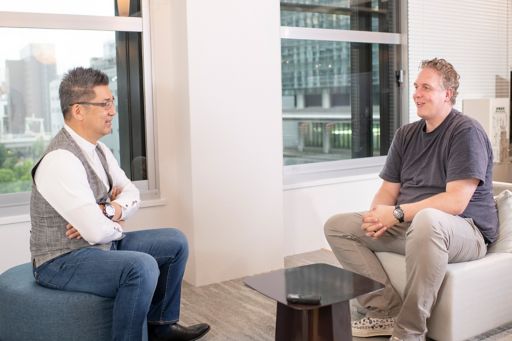
Chatani: Talking about Japanese manufacturers, how far do you think the DX (Digital Transformation) of Japanese companies has climbed to in terms of Mt. Fuji?
Denley: It has probably reached the area where we can drive by car. From here on, we must work hard and climb with our own feet.
Chatani: So, what can you think of that will make the climb difficult?
Denley: The fact that they do not realize that previous common knowledge “can be changed,” I think, is a big obstacle. The changes made due to the COVID-19 crisis are good examples. It was the external, not internal, stimulus that triggered the changes. However, it will not be possible to promote DX unless we can change common knowledge from inside going forward.
Chatani: I see. While people are saying “new normal from now,” there may be movements that will try to return to the previous normal. There may be client-related work where face-to-face interaction is preferable and it may go back to the old normal. But, on the other hand, I’m sure there will be cases where the opposite party will decline visits.
Denley: Other factors that may impede the promotion of DX is that there is little awareness that “technology literacy is low.” You will understand this well if you go to the bookstore, as there are many books dedicated to explaining technology. People seem to believe that they will understand technology if they read these books. But they are only searching for buzzwords and are unable to reach the essence.
Chatani: Also, technologies are changing by the minute.
Denley: The basis for promoting DX, I think, is actually in the nature of the company. It may be that it has not yet reached the corporate culture and the structure of the organization itself. Even if companies “set up an innovation lab,” it has little relevance to their existing business in many cases. I think this is why there are many cases where demonstration experiments are held but do not lead to anything more.
Chatani: When starting something new, there seem to be many cases that are implemented organization-first and not idea-first. Even if a “package” called an organization is created, nothing will progress without ideas. On the other hand, if there are ideas, things may proceed regardless of whether there is an organization or not.
Managers Will No Longer Be Able to Say “It Was Unforeseen”
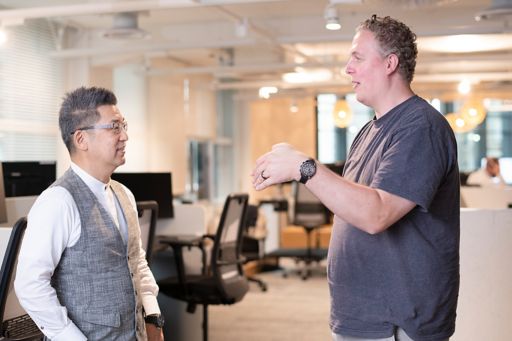
Denley: This is not limited to the promotion of DX, but we are at a stage where managers themselves must change leading into the post-COVID-19 world. People who were said to be outstanding managers seem to have followed their hunch to some extent when deciding about their business. They have been taking risks based on limited data and restricted knowledge.
However, future managers will be making decisions based on real data. This will require skills that are different from conventional ways of doing business. If they are going to depend on data instead of themselves, they must decide “to what extent can I understand the accuracy of data?” and “how much time will be required to improve data?” The concept of managers will change in this way.
Chatani: If it is possible to obtain highly real-time data, as I mentioned previously, there will be variations in the possible scenarios and it will be difficult for them to make excuses that “it was unforeseen”. While everything other than a “certain scenario” that was driven by limited data and information was considered as “unforeseen” until now, they will be required to expand the range of “expected scenarios” a little more. This is what data-driven decisions are.
While computers can make recommendations based on data, such as “there is XX% chance of this happening,” it doesn’t mean that it is correct if the probability is high. When top soccer players are trapped, they sometimes choose to kick the ball to a narrow space rather than to a wide opening. This is an outmaneuvering play based on the idea that “the opponent will think that the ball will not come this way,” and the possibility of this being the correct choice for the player may be higher.
This type of stunt is what makes a professional but business is also a competition. Thinking not only of oneself but also the movement of other players and daringly choosing what others do not expect may result in success. These final decisions will remain as human tasks.
What is Necessary for Organizations to Survive in the Post-COVID-19 World?
Denley: We talked about the changes in managers themselves but it will be necessary to review the empowerment of organizations in order to promote DX. There are probably many employees that have ideas that can make their company better. The problem is that the company is not organized in a way in which they can act on these ideas.
Chatani: Does it mean that directions and support from the top are necessary?
Denley: There are many ways to do it but one method, which remains in my mind, is the method of Yahoo!’s Marissa Mayer. I heard that she passed a real hat to the team or person with good ideas and created an environment where they can move freely for a while by giving them the power of the president. From what I heard, this method has led to amazing innovations.
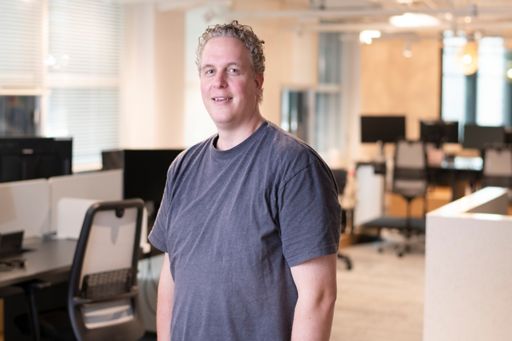
It is both the advantage and disadvantage of Japanese companies that they try to solve everything organizationally. Working as an organization is a very good thing but only general actions can be taken and detailed movements cannot be made without organizational authority. This results in the creation of an inflexible environment where decisions are made by everyone with no one taking responsibility.
I think that the essence of flexibility is accountability at the individual level. For Japanese companies, giving consent to accountability at the individual level will be very important.
Chatani: You’re right. I think they are culturally positioned at the extreme opposite.
Denley: Meanwhile, I think it will be necessary to reconsider the relationships between companies. For instance, when a new service is launched in Silicon Valley, there are many cases where operations are implemented by “working together with a neighbor company for settlement-related operations rather than doing it on their own” or “partnering with others because they feel insecure about front-end operations.” However, when Japanese companies decide to form a partnership, they tend to go very deep.
Chatani: Yes, startups in Silicon Valley know that they cannot carry out comprehensive operations by themselves so they are skilled at utilizing external networks. On the other hand, as Japanese companies are comprehensive, they tend to think that they can do everything by themselves and try to do everything internally even if they are not very good at it.
What is Necessary for Promoting DX for Individuals?
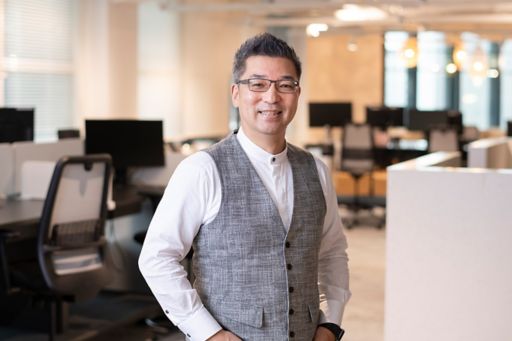
Chatani: From what we have discussed, we can see that ultimately it is the “people that must change” including Japanese companies and managers. Based on this, what do you think is “essential in promoting one’s own DX?”
Denley: Well, I think it is our mind, that is, to recognize that “it is ok to change common knowledge.”
Chatani: Behaviors may differ greatly based on whether one thinks that common knowledge is only a temporary rule or a public rule.
Denley: Adding to that, it is necessary to think that “common knowledge is a temporary thing” and at the same time understand the “period during which it is considered common knowledge.” Common knowledge has been changing in a 20-30 year span until now but this span is gradually becoming shorter. It is important to acknowledge that it is “becoming shorter” and to also understand what triggers our decision to think “that it is ok to change what we think is common knowledge.”
Chatani: What I noticed regarding common knowledge is that I no longer exchange name cards when I do business overseas.
Denley: I guess the method for connecting with people is different. Many people are now connecting through LinkedIn and business people are skillfully using such information.
The culture of exchanging name cards in Japan served as a tool that provides an opportunity to seek further information from the limited information on the cards. But now that social media including LinkedIn are being used, it has become easier to obtain information that is not mentioned on the name card, such as points in common between people.
Chatani: Discussions to abolish name cards may come up following the seal stamping system.
Denley: In Japan, a “digital-real” method such as exchanging LINE IDs may also become possible.
Chatani: When I participate in online meetings, I show my LinkedIn QR code in the background so that others can search the code. If we can obtain the background of each other in advance, we will be able to imagine how far we need to explain things about ourselves.
Denley: As we can obtain information from LinkedIn, it is easier to create relationships of trust from the beginning. The fact that more data enables us to build trust will bring about great changes for individuals and for companies as well.
Chatani: It may be possible to say that the ratio of employees with LinkedIn accounts shows the digital level of the company. But we must also be careful as there are quite a lot of fake accounts.
Denley: The advantage of blockchain is that we can check these things. It can enhance transparency by preventing various data from being altered.
If we can achieve developments in this area, we will be able to make use of it in the due diligence of the supply chain at the corporate level. If we can ensure the transparency of the supply chain more accurately and quickly, it will enable us to determine the credibility of the company more quickly. There is currently no concept for disclosing it and some people may think that this is impossible and unfeasible. But those who realize that they can benefit by disclosing it will be the ones that will get the chance to achieve further growth.
Outlook for Digital Management
Chatani: As we are in an age of change, those that grasp this as an opportunity will have a better future while those that pass it by will not. Based on this timing, success will be the source of further reinvestments, which will probably create a wider gap, meaning that we have to be No. 1, not No. 2.
Denley: You’re absolutely right! Transforming challenges into opportunities is the key. We must prepare ourselves and “aim for our goal” even when attacked. Being able to brace ourselves to “become No. 1“ and not No. 2 will serve as the foundation for our growth thereafter. Resigned feelings of accepting a medium level and being positioned side-by-side will probably disappear.
Then everything will advance in an agile manner so that we can increase our endeavors to become No. 1. I believe that management will shift to the fail-first way where we will be able to finally succeed after making disastrous failures.
*This article is based on an interview as of October 2020.
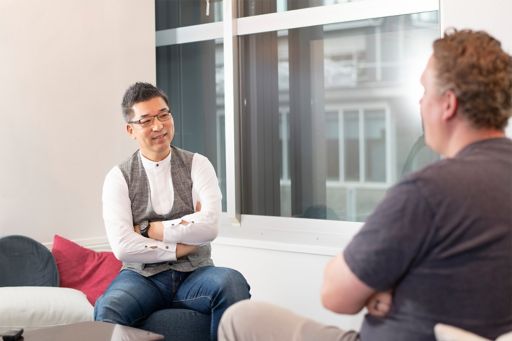
Follow us on KPMG Ignition Tokyo LinkedIn for the latest news.
Connect with us
- Find office locations kpmg.findOfficeLocations
- kpmg.emailUs
- Social media @ KPMG kpmg.socialMedia



